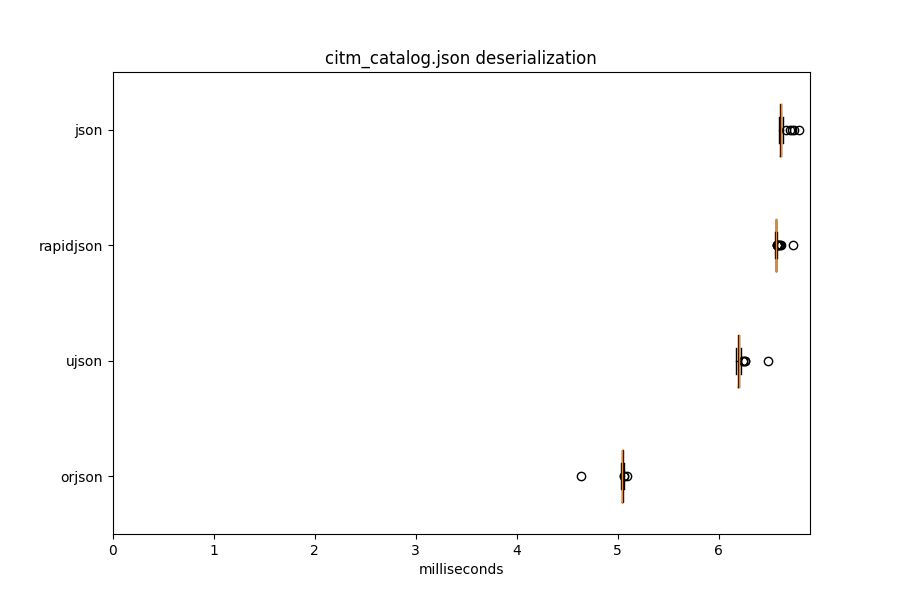orjson is a fast JSON library for Python. It benchmarks as the fastest Python library for JSON serialization, with 1.6x to 2.6x the performance as the nearest other library, with deserialization performance of 0.95x to 1.2x the nearest other library.
It supports CPython 3.5, 3.6, and 3.7. It is not intended as a drop-in replacement for the standard library's json module.
To install a manylinux wheel from PyPI:
pip install --upgrade orjsonTo build a release wheel from source, assuming a Rust nightly toolchain and Python environment:
git clone --recurse-submodules https://github.com/ijl/orjson.git && cd orjson
virtualenv .venv && source .venv/bin/activate
pip install --upgrade pyo3-pack
pyo3-pack build --release --strip --interpreter python3.7There is no runtime dependency other than a manylinux environment (i.e., deploying this does not require Rust or non-libc type libraries.)
def dumps(obj: Union[str, bytes, dict, list, tuple, int, float, None]) -> bytes: ...dumps() serializes Python objects to JSON.
It has no options, does not support hooks for custom objects, and does not support subclasses.
It raises TypeError on an unsupported type or a number that is too large.
The error message describes the invalid object.
import orjson
try:
val = orjson.dumps(...)
except TypeError:
raisedef loads(obj: Union[bytes, str]) -> Union[dict, list, int, float, str]: ...loads() deserializes JSON to Python objects.
It raises orjson.JSONDecodeError on invalid input. This exception is a
subclass of ValueError.
import orjson
try:
val = orjson.loads(...)
except orjson.JSONDecodeError:
raiseThere are slight differences in output between libraries. The differences are not an issue for interoperability. Note orjson returns bytes. Its output is slightly smaller as well.
>>> import orjson, ujson, rapidjson, json
>>> data = {'bool': True, '🐈':'哈哈', 'int': 9223372036854775807, 'float': 1.337e+40}
>>> orjson.dumps(data)
b'{"bool":true,"\xf0\x9f\x90\x88":"\xe5\x93\x88\xe5\x93\x88","int":9223372036854775807,"float":1.337e40}'
>>> ujson.dumps(data)
'{"bool":true,"\\ud83d\\udc08":"\\u54c8\\u54c8","int":9223372036854775807,"float":1.337000000000000e+40}'
>>> rapidjson.dumps(data)
'{"bool":true,"\\uD83D\\uDC08":"\\u54C8\\u54C8","int":9223372036854775807,"float":1.337e+40}'
>>> json.dumps(data)
'{"bool": true, "\\ud83d\\udc08": "\\u54c8\\u54c8", "int": 9223372036854775807, "float": 1.337e+40}'The library has comprehensive tests. There are unit tests against the roundtrip, jsonchecker, and fixtures files of the nativejson-benchmark repository. It is tested to not crash against the Big List of Naughty Strings. There are integration tests exercising the library's use in web servers (uwsgi and gunicorn, using multiprocess/forked workers) and when multithreaded. It also uses some tests from the ultrajson library.
Serialization performance of orjson is better than ultrajson, rapidjson, or json. Deserialization performance is better to about the same as ultrajson.
| Library | Median (milliseconds) | Operations per second | Relative (latency) |
|---|---|---|---|
| orjson | 7.59 | 131.8 | 1 |
| ujson | 7.26 | 133.5 | 0.96 |
| rapidjson | 26.72 | 37.4 | 3.52 |
| json | 26.78 | 37.3 | 3.53 |
| Library | Median (milliseconds) | Operations per second | Relative (latency) |
|---|---|---|---|
| orjson | 4.99 | 200.3 | 1 |
| ujson | 8.16 | 122.5 | 1.64 |
| rapidjson | 43.27 | 23.1 | 8.67 |
| json | 48.15 | 20.8 | 9.65 |
| Library | Median (milliseconds) | Operations per second | Relative (latency) |
|---|---|---|---|
| orjson | 5.05 | 198.2 | 1 |
| ujson | 6.2 | 161.2 | 1.23 |
| rapidjson | 6.57 | 152.2 | 1.3 |
| json | 6.62 | 151.1 | 1.31 |
| Library | Median (milliseconds) | Operations per second | Relative (latency) |
|---|---|---|---|
| orjson | 1 | 997.4 | 1 |
| ujson | 2.54 | 394.1 | 2.53 |
| rapidjson | 2.38 | 419.5 | 2.38 |
| json | 5.26 | 190 | 5.25 |
| Library | Median (milliseconds) | Operations per second | Relative (latency) |
|---|---|---|---|
| orjson | 0.23 | 4310.6 | 1 |
| ujson | 0.23 | 4414.3 | 0.98 |
| rapidjson | 0.23 | 4229.4 | 1 |
| json | 0.23 | 4176.3 | 1 |
| Library | Median (milliseconds) | Operations per second | Relative (latency) |
|---|---|---|---|
| orjson | 0.06 | 16357.9 | 1 |
| ujson | 0.13 | 7531.2 | 2.17 |
| rapidjson | 0.16 | 6362.9 | 2.57 |
| json | 0.23 | 4242.5 | 3.8 |
| Library | Median (milliseconds) | Operations per second | Relative (latency) |
|---|---|---|---|
| orjson | 2.6 | 385.5 | 1 |
| ujson | 2.98 | 336.5 | 1.15 |
| rapidjson | 2.84 | 339.1 | 1.09 |
| json | 2.84 | 345.9 | 1.09 |
| Library | Median (milliseconds) | Operations per second | Relative (latency) |
|---|---|---|---|
| orjson | 0.56 | 1790 | 1 |
| ujson | 1.44 | 693.9 | 2.58 |
| rapidjson | 1.57 | 636.1 | 2.82 |
| json | 2.21 | 452 | 3.96 |
This was measured using orjson 1.2.0 on Python 3.7.1 and Linux. The above can be
reproduced using the pybench and graph scripts.
orjson is dual licensed under the Apache 2.0 and MIT licenses. It contains code from the hyperjson and ultrajson libraries. It is implemented using the serde_json and pyo3 libraries.







